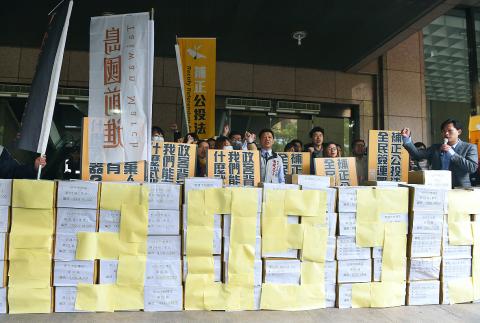Youth activist group Taiwan March yesterday submitted its petition to reform the much-maligned Referendum Act (公民投票法), following a seven-month campaign in which scores of grassroots volunteers canvassed across the nation.
The petition garnered about 130,000 signatures — well past the threshold of 90,000 for the petition’s first stage — paving the way for the petition’s second phase.
The group aims to abolish the current 50 percent turnout threshold in the Referendum Act, saying that the “unattainable threshold” stifles voters’ constitutional right to express their views through direct democracy.

Photo: Chien Jung-fong, Taipei Times
Led by Taiwan March cofounder and Academia Sinica researcher Huang Kuo-chang (黃國昌), the group demanded that a referendum be held on the issue to coincide with the presidential elections in January next year.
“The right for people to participate in referendums has been restricted and deprived by the ‘birdcage’ Referendum Act itself,” Huang said.
While six nationwide referendums have been held since the passage of the Referendum Act in 2003, none has been declared valid, as each failed to meet the turnout threshold.
By law, general referendums can be initiated by members of the public through a two-stage process: a first-phase petition that requires the support of 0.5 percent of the electorate, followed by a second phase that requires signatures from 5 percent.
As there are about 18 million eligible voters in the nation, the petition’s first phase required the support of about 90,000 citizens, while its upcoming second phase will require at least 900,000 signatures.
The second phase of the petition is to begin after the Central Election Commission ratifies the petition’s first phase within about a month.
Given that the petition’s second phase will require completion within six months, the group will need about 150,000 signatories a month — more than what the group achieved in more than half a year.
Taiwan March volunteers caused a minor stir outside the Central Election Commission’s offices in Taipei yesterday when they arrived with more than 100 large cardboard boxes filled with petition forms.
In addition to the campaign to launch a referendum, Huang called on legislators to amend the Referendum Act, saying that both paths toward reform should be pursued concurrently.
He demanded that legislators propose an amendment to the act by the end of this legislative session — which is to close by the end of May — and vowed to organize mass protests if legislators failed to launch related reforms.
Taiwan March was one of the numerous youth advocacy groups that blossomed in the wake of the Sunflower movement, in which student-led protesters occupied the Legislative Yuan’s main chamber for 23 days in March and early April last year to protest the government’s handling of a proposed trade deal with China.
Founded by Huang and prominent Sunflower movement student leaders Lin Fei-fan (林飛帆) and Chen Wei-ting (陳為廷), the group has since focused its efforts on reforming the Referendum Act, saying that events leading up to the Sunflower movement illustrated systemic problems with the nation’s democratic representation.

CHAOS: Iranians took to the streets playing celebratory music after reports of Khamenei’s death on Saturday, while mourners also gathered in Tehran yesterday Iranian Supreme Leader Ayatollah Ali Khamenei was killed in a major attack on Iran launched by Israel and the US, throwing the future of the Islamic republic into doubt and raising the risk of regional instability. Iranian state television and the state-run IRNA news agency announced the 86-year-old’s death early yesterday. US President Donald Trump said it gave Iranians their “greatest chance” to “take back” their country. The announcements came after a joint US and Israeli aerial bombardment that targeted Iranian military and governmental sites. Trump said the “heavy and pinpoint bombing” would continue through the week or as long

TRUST: The KMT said it respected the US’ timing and considerations, and hoped it would continue to honor its commitments to helping Taiwan bolster its defenses and deterrence US President Donald Trump is delaying a multibillion-dollar arms sale to Taiwan to ensure his visit to Beijing is successful, a New York Times report said. The weapons sales package has stalled in the US Department of State, the report said, citing US officials it did not identify. The White House has told agencies not to push forward ahead of Trump’s meeting with Chinese President Xi Jinping (習近平), it said. The two last month held a phone call to discuss trade and geopolitical flashpoints ahead of the summit. Xi raised the Taiwan issue and urged the US to handle arms sales to

BIG SPENDERS: Foreign investors bought the most Taiwan equities since 2005, signaling confidence that an AI boom would continue to benefit chipmakers Taiwan Semiconductor Manufacturing Co’s (TSMC, 台積電) market capitalization swelled to US$2 trillion for the first time following a 4.25 percent rally in its American depositary receipts (ADR) overnight, putting the world’s biggest contract chipmaker sixth on the list of the world’s biggest companies by market capitalization, just behind Amazon.com Inc. The site CompaniesMarketcap.com ranked TSMC ahead of Saudi Aramco and Meta Platforms Inc. The Taiwanese company’s ADRs on Tuesday surged to US$385.75 on the New York Stock Exchange, as strong demand for artificial intelligence (AI) applications led to chip supply constraints and boost revenue growth to record-breaking levels. Each TSMC ADR represents

State-run CPC Corp, Taiwan (CPC, 台灣中油) yesterday said that it had confirmed on Saturday night with its liquefied natural gas (LNG) and crude oil suppliers that shipments are proceeding as scheduled and that domestic supplies remain unaffected. The CPC yesterday announced the gasoline and diesel prices will rise by NT$0.2 and NT$0.4 per liter, respectively, starting Monday, citing Middle East tensions and blizzards in the eastern United States. CPC also iterated it has been reducing the proportion of crude oil imports from the Middle East and diversifying its supply sources in the past few years in response to geopolitical risks, expanding